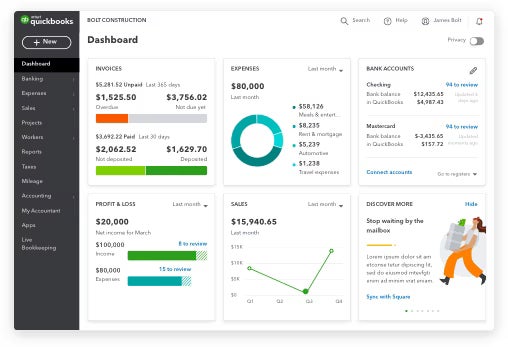Learn the differences between bookkeeping and accounting, including their respective roles and responsibilities.
If you’re a business owner, understanding the differences between bookkeeping and accounting can be confusing. While you may have heard other people use these terms interchangeably, bookkeeping and accounting are actually two separate (but closely related) business activities. Both bookkeeping and accounting are essential for maintaining the financial health of your company.
In this guide, we’ll explain what bookkeeping is, what accounting is and the key differences between them. By the end, you should be able to decide whether your business needs to hire a bookkeeper, accountant or both.
Jump to:
What is bookkeeping?
Bookkeeping is the process of recording your company’s financial transactions on a daily basis. Bookkeeping captures all money flowing into and out of a business, including bills, receipts, invoices, purchase orders and vendor payments. There are several different ways to record bookkeeping, such as writing it by hand in a notebook, typing it into an Excel spreadsheet, and inputting the data into bookkeeping software.
What is accounting?
Accounting is a broader activity that encompasses recording a company financial transaction through bookkeeping as well as other tasks such as preparing tax returns and offering financial planning advice.
SEE: Best Accounting Software for Small Businesses in 2023
All bookkeeping activities fall under accounting, but not all accounting activities are bookkeeping — businesses need both accounting and bookkeeping to stay financially healthy. Most accounting software, such as the every popular QuickBooks (Figure A), includes bookkeeping functionality as part of its software package.
Figure A

Bookkeeping vs. accounting: Key differences
Typical responsibilities
At first glance, accounting and bookkeeping may seem very similar, but they each encompass different activities. To contrast bookkeeping and accounting, we’ve outlined the main differences in the chart below.
| Bookkeeping | Accounting |
|---|---|
|
|
Education required
Most bookkeepers have a high school degree or GED. There is no formal education degree or certification requirements for bookkeepers, though many bookkeepers have taken some sort of class or training on the subject. Others are self-taught and learn bookkeeping simply through using QuickBooks or other accounting software.
Some bookkeepers choose to earn an optional certification from associations such as National Association of Certified Public Bookkeepers or the American Institute of Professional Bookkeepers.
Accountants must have at least a bachelor’s degree and most have logged at least 150 credit hours of accounting and business courses. Since most bachelor’s degrees only provide 120 hours of course credit, many accountants complete a master’s degree as well. They also need hands-on experience through internships and other professional opportunities.
Accountants don’t have to sit for the Certified Public Accountant (CPA) exam, but many choose to do so. Passing the CPA exam and joining the American Institute of Certified Public Accountants allows accountants to do more things, such as represent people and companies before the IRS and act as external auditors. Many businesses specifically seek to hire CPAs to file their company’s tax returns.
Skills needed
Both bookkeepers and accountants need to pay close attention to detail and be able to make fast and accurate mathematical calculations. This allows them to spot and verify any inconsistencies in a business’ financial reporting. They also need to have a problem solving mindset that helps them figure out the underlying causes behind these errors.
Accountants must also go further to take a higher-level strategic view of the business to offer financial planning advice. They must be skilled at accurately interpreting financial reports and understanding what they mean for the financial health of the business in question.
To learn more about accounting terminology, download the accounting glossary from Tech Republic Premium.
Roles in bookkeeping
Bookkeepers typically manage the following processes:
- Recording financial transactions.
- Posting debits and credits to a journal.
- Maintaining the chart of accounts.
- Preparing financial statements.
- Processing payroll.
Roles in accounting
Accountants typically manage the following processes:
- Reviewing and analyzing financial statements.
- Giving financial planning advice.
- Performing audits.
- Filing relevant tax returns.
- Helping you apply for business loans.
Does your business need a bookkeeper or an accountant?
Businesses of all sizes may choose to hire a bookkeeper, accountant or both — either in house or outsourced. Bookkeepers are typically more affordable, since they have less educational requirements they need to fulfill. They can take care of many tedious tasks that take up a lot of a business owner’s time. However, bookkeepers are not qualified to help with more advanced activities, such as filing your taxes.
Accountants are more expensive, but they are qualified to do more things for your business, such as prepare financial statements and file taxes. They must also keep their certifications current, which means they will be up to date on the latest federal, state and local tax laws that can affect your business.
Many small businesses owners choose to do their own bookkeeping, then hire an outside CPA to generate and file their tax returns. Other businesses employ both bookkeepers and accountants — or one person who takes care of both their bookkeeping and accounting. If you already use a CPA and want to hire a bookkeeper, ask your accountant for recommendations.
Whether you decide to do your own accounting and bookkeeping or to outsource it, using an accounting software such as QuickBooks will make things easier on you and whomever you hire. Ideally, your business, your bookkeeper and your accountant should use the same cloud-based software to make it easier to share information. Check out some of our favorite accounting software titles to start your search.
Featured payroll solutions
Source of Article



